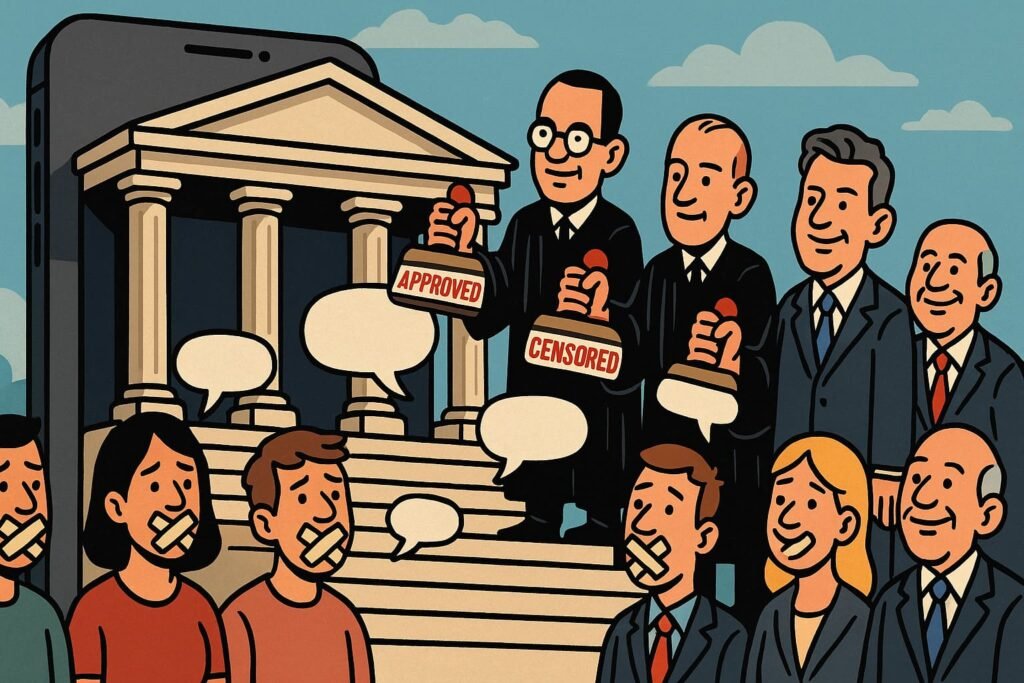Big Tech & Censorship – The New Gatekeepers of Truth
Big Tech promised freedom. Social media would give everyone a voice, search engines would democratise information, and digital platforms would break the monopoly of old media.
Instead, a handful of companies became the new gatekeepers of truth. They decide what you see, what you can say, and which voices get silenced. The language is about “safety” and “harm reduction.” The reality is censorship, monopoly power, and a tight alliance between Silicon Valley, governments, and corporations.
Table of contents
The reality is censorship, monopoly power, and a tight alliance between Silicon Valley, governments, and corporations.
How Big Tech Took Control
It started innocently enough. Free platforms, free speech, free information. But as these companies grew, they became too powerful to ignore.
- Algorithms decide which opinions are visible and which vanish into the void.
- Deplatforming shuts out individuals and groups with a single click.
- Partnerships with governments blur the line between private company and public censor.
What began as tools of connection turned into tools of control.
Censorship by Algorithm
Big Tech rarely censors openly. Instead, algorithms do the job: shadow bans, demonetisation, “fact-checks.” Speech isn’t outlawed; it’s quietly buried where no one will find it.
This is worse than old-fashioned censorship. At least you knew when a book was banned. Today, you don’t even know you’ve been silenced.
The Business Model of Control
Why does Big Tech care about censorship? Because controlling speech protects profits. Advertisers don’t like controversy. Politicians don’t like criticism. By managing what people see, platforms keep both happy.
And let’s be honest: outrage pays. Big Tech doesn’t just censor — it also amplifies conflict. The goal isn’t truth. It’s engagement.
Who Benefits?
- Tech giants – monopoly power and political influence.
- Governments – censorship outsourced to private firms.
- Corporations – fewer critics, more friendly branding space.
The losers are ordinary users, who discover the “free internet” was never really free.
Why It Matters
Big Tech platforms are the public square of our time. When a handful of companies control that square, free speech becomes conditional. And conditional speech isn’t free speech at all.
The irony is that platforms built on the promise of open communication now define the limits of communication.
Conclusion
Big Tech didn’t just build apps — it built the infrastructure of modern speech. And now it polices that speech in the name of safety, while protecting its profits and power.
The next time your feed feels strangely uniform, ask yourself: is this really what people are saying, or just what Big Tech allows you to see?
👉 For the bigger picture of how corporations gained their power, visit The Power of Business & Corporations Explainer Hub.
FAQ Section
What is Big Tech censorship?
It’s when platforms like social media and search engines control speech through bans, algorithms, and partnerships with governments.
How does Big Tech censor speech?
Through shadow bans, demonetisation, fact-checking labels, and algorithmic suppression that hides content without openly banning it.
Why does censorship benefit Big Tech?
It protects profits, keeps advertisers happy, avoids political trouble, and strengthens monopoly power.
Who loses in Big Tech censorship?
Ordinary users. They get less free expression and a narrower view of what society is really saying.



